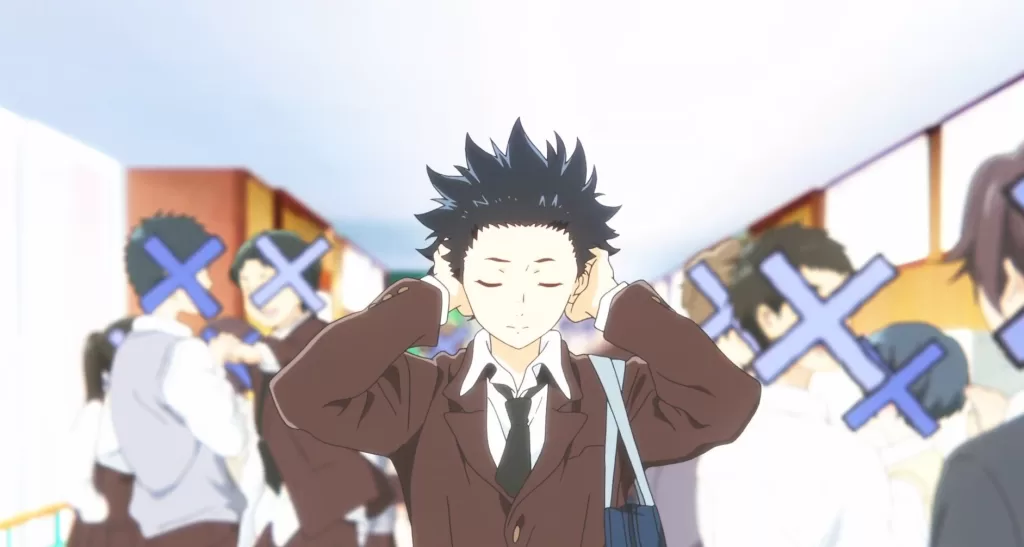Where to Watch:
8.9/10
FilmFascination Rating
‘A Silent Voice’ was the first anime film I ever watched, and honestly, it just blew me away.
This might get a little personal, but bear with me till the end — because some movies don’t just entertain you, they stay with you. Produced by the iconic Kyoto Animation and directed by Naoko Yamada, A Silent Voice is one such unforgettable experience.
The movie opens with Shoya Ishida, a high school student, standing on the brink of suicide. It’s a stark, heavy start that leaves you stunned. We’re then transported back to Shoya’s childhood, when he was a carefree sixth grader. Life seems normal until Shoko Nishimiya joins their class — a girl who looks like any other student until she uses a notebook to reveal she’s deaf, requesting her classmates to communicate through writing.
At first, Shoya is curious, but frustration and immaturity get the better of him, and he turns into a bully.
And that’s one of the film’s brutally honest points — when you’re young, you often don’t realise the consequences of your actions. You do stupid things for attention, for laughs, just to fit in. It’s only later, sometimes painfully late, that the realisation hits.
One of the most pragmatic and gut-wrenching moments comes when Shoya’s classmates, who once laughed along while he bullied Shoko, quickly turn against him when the principal gets involved. Even the teacher, who passively watched the bullying happen, shifts the blame onto him.
A Silent Voice doesn’t shy away from showing how cruel children — and adults — can be when they don’t understand something different.
The cruelty isolates Shoya to the point where he becomes painfully awkward, socially withdrawn, and unable to make eye contact. His so-called friends abandon him, mocking even the smallest things he once liked. It’s heartbreaking — and yet, so real.
Crushed under the weight of guilt and regret, a teenage Shoya finally decides he needs to make amends.
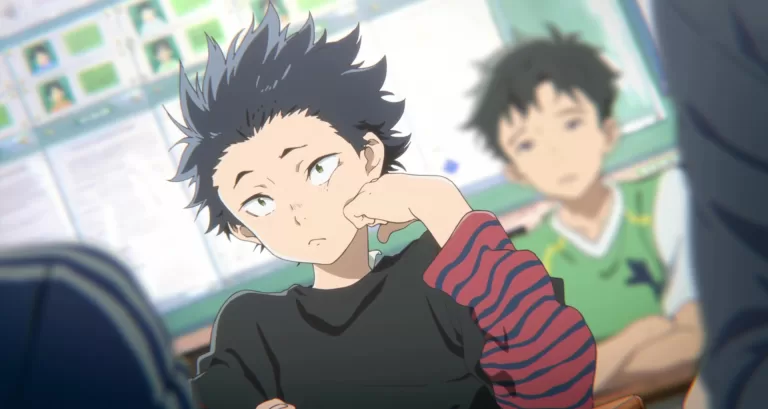
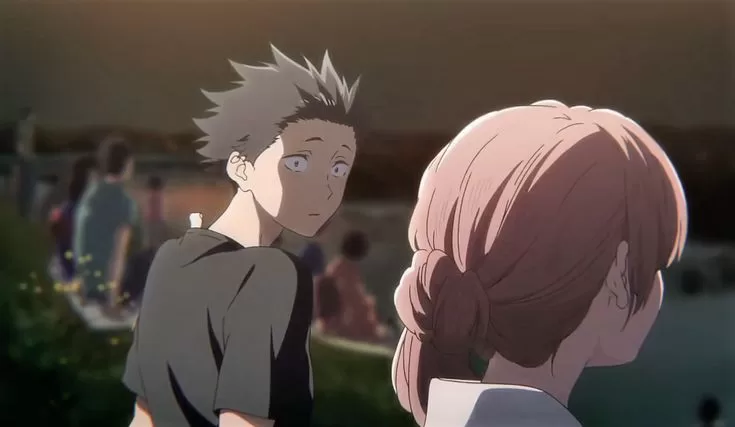
The animation of A Silent Voice is breathtaking.
Some frames are so detailed, so evocative, they almost feel like delicate paintings. Naoko Yamada’s direction shines — using subtle, abstract flashbacks to send waves of emotion without even needing words. The dynamic camera focus not only adds visual beauty but mirrors Shoya’s mental state brilliantly. You aren’t just watching Shoya; you are feeling what he feels.
Shoya is a “work in progress” throughout the movie. He does terrible things, but somehow, the film still pulls you into sympathizing with him.
Because sometimes we’re all stuck — anxious, afraid, awkward — and the only way forward is facing the past. A Silent Voice understands that better than most.
What makes this film stand out is its raw realism. No character is perfect.
Each one is flawed, hurting, trying to heal in their own way.
And the voice acting deserves its own round of applause — it was just spot on, hitting all the right emotional notes without being overdone.
It’s no surprise it took Kyoto Animation two years to bring this adaptation of the manga “The Shape of the Voice” to life.
Even Makoto Shinkai, the legendary director of Your Name, called it “a fantastic piece of work” — and admitted it would be difficult for even him to replicate its depth.
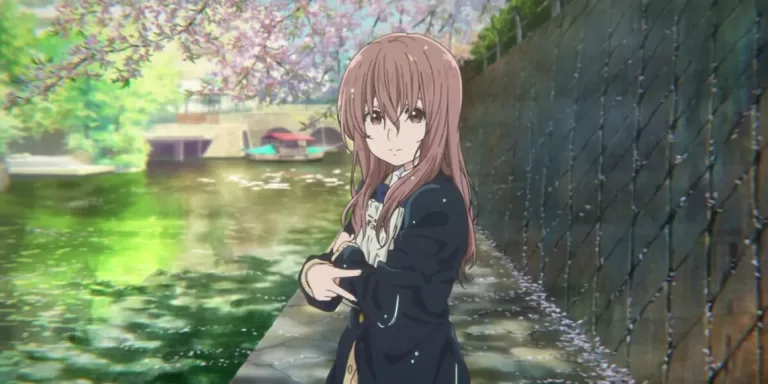
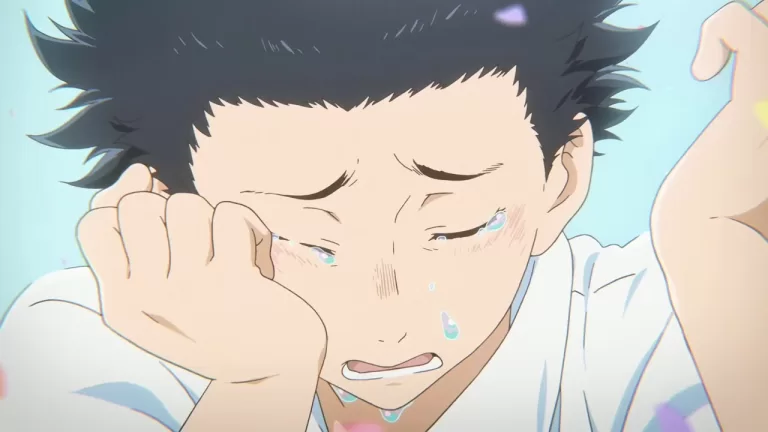
The themes A Silent Voice covers are vast — bullying, disability, regret, suicide, peer pressure, real friendship, mental health, detachment — but it never feels overwhelming.
Instead, it feels natural, like an honest slice of life many teenagers endure quietly.
Rarely have I seen a movie (animated or otherwise) that handles such mature, difficult themes with so much tenderness and respect.
The use of blue crosses over people’s faces to depict Shoya’s alienation is sheer genius.
I remember immediately scribbling “genius” in my notebook when I saw it during the film. It’s that powerful. The movie steps so fully into Shoya’s perspective that you feel his fear, his hesitation, his longing to reconnect.
Some moments are heartwarming, others are painfully hard to watch.
There were scenes where I teared up, smiled quietly, and even just sat still, completely shook.
My heart hasn’t felt this heavy after a movie in a long, long time.
The score by Kensuke Ushio — those intense, cheerful piano notes — further layers the emotions, making the entire experience even more haunting.
A Silent Voice is a deeper, riskier project than most animated films dare to be.
And I’ll be honest — not everyone will get it.
But if you do, if it connects with you, I promise it will stay with you for a very long time.
It has for me.
Favourite Quotes
Miyoko Sahara: I couldn’t change. I couldn’t protect you again. I was the same coward.
Shoko Nishimiya: You can change from now on.
Tomohiro: Now you and I is friends. It can be as simple as that, ya see? Friendship don’t gotta do with no rule or qualifications, cause its about something deeper, a bond, and you just can’t break it, Capisce?
Miki: We were all so worried about you. I know life can be hard sometimes, but it’s like that for everyone. The thing is, you have to accept the bad parts of yourself with the good and just move forward.
Yuzuru Nishimiya: I thought if she saw what death looked like, she’d stop saying she wanted to kill herself. I didn’t know what else to do.
Join the FilmFascination Club!
All the updates right in your Inbox! (We will never spam you with junk mails)
You will get a message on the top of the form once your subscription is successful.

